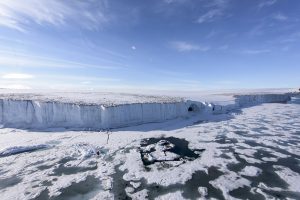The fear of bypass: the flexible diplomacy of jacking-up and stretching out Singapore’s Arctic connections
May 15, 2022

The significance and importance of maritime trade to Singapore’s economy cannot be understated. For over 150 years, Singapore was designed to be a free port, serving as an indispensable calling station between India and the so-called ‘West Asia’ and ‘Far East’. Since independence, Singapore has ranked as the world’s second busiest port in terms of total shipping tonnage. However, the opening up of the Northern Sea Route (NSR) as a result of retreating sea ice in the Arctic region has threatened to disrupt Singapore’s connections to global maritime traffic and jeopardise Singapore’s status as a global shipping hub.
In “The fear of bypass: the flexible diplomacy of jacking-up and stretching out Singapore’s Arctic connections” (in ‘Observing the Arctic: Asia in the Arctic Council and Beyond’ (2020)), Associate Professor Chih Yuan Woon (NUS Department of Geography) and Professor Klaus Dodds (Royal Holloway, University of London) study case studies of Singapore’s lobbying practices and ongoing undertakings in the Arctic Council and various Arctic-related events as well as accompanying media coverage and public discussions of such participation to point out how Singapore’s official portrayal and conduct of its Arctic interests are not stable and consistent. Rather, certain areas of Singapore’s Arctic strategy are hyped up while others are systematically downplayed. This can be accounted to Singapore’s ‘small-state’ status, which necessitates it to be flexible in its strategic positioning and diplomatic efforts on the international stage.
With this strategy of flexible diplomacy in mind, A/P Woon and Prof Dodds state that building relationships with other ‘small states’ such as Iceland and Norway has been integral to Singapore’s relationship with the Arctic. Singapore, being a tropical country, did not appear to have obvious interests in the Arctic, much less have a role to play in the Arctic Council. In fact, the intentions of Asian states’ interest in joining the Arctic Council were questioned, with Canada and Russia even openly expressing their concern that a greater number of Arctic Council participants could make arriving at agreements more difficult and time-consuming.
A/P Woon and Prof Dodds argue that just like the upward and downward jacking of loading cranes, Singapore’s Arctic interventions can be said to be underpinned by a logic of flexible diplomacy and geography that can be jacked up and down to suit the country’s goals and objectives at any particular period of time. They posit that a ‘small-state imagination’ dominates the geopolitical discourses and practices of the governmental elites in Singapore – referring to the importance of Singapore having to stand up for its own ideals, principles, and interests rather than being meekly compliant to the major powers and their geopolitical and geo-economic interests. Yet despite the defense that Singapore’s international and diplomatic presence should not be limited by its formal size or national geography, there is a simultaneous recognition that the country should exercise discretion in the handling of international affairs, especially in the face of unpredictable and uncertain geopolitical outlooks.
Singapore’s application for observership in the Arctic Council was submitted in December 2011 and granted on 15 May 2013. Singapore’s contributions and relevance to Arctic affairs are ‘jacked-up’ so that the country will not be bypassed in important deliberations that are of tremendous concern to its ecological and economic well-being. On the other hand, certain facets of Singapore’s interventions and efforts, such as Singapore’s resource ambitions in the Arctic, are ‘jacked-down’ to allay possible fears about Singapore’s forays into the region and instead allow for greater trust to be fostered.
Read the full chapter here.
